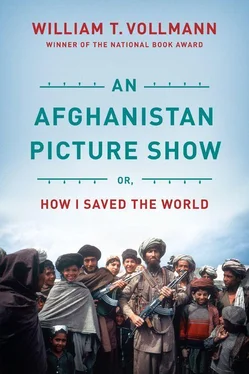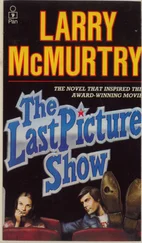The Young Man admired the General in almost every respect. He was a very moral man who tried to do good. He initiated the building of a mosque, of a park (the Young Man saw him on the news once, standing with a group of dignitaries in his new mosque). He did a considerable amount of social work; the Young Man was one of his cases. Not only did he give him instruction in Islam, he also tried to find an appropriate group for him to go to Afghanistan with. On this subject he had his opinions. Being a soldier like the Brigadier, he despised the fundamentalists. When the Young Man asked a guerrilla commander why he belonged to Herakat and not Jamiat-i-Islami, the General answered for him: “Because he is not a fool.”
BETROTHED
One afternoon they had Mr. Pizzarda, the Secretary-General of Hazarat, over for a drink (of Sharbet, a sickening syrup of sugared rose petals). The Brigadier had said that Pizzarda was one of his men. Was he? It was impossible to tell. — They sat in the patio chatting about this and that, sometimes, out of politeness to the Young Man, in English, and sometimes, very fiercely, in Pashto. The General seemed a little left out of it. But when he sat with the Young Man later that night, against the soothing roar of the fan, he said that in ten days the Young Man could go into Afghanistan with the N.L.F.
“But we must be very careful,” the General said. “You may only go if you are completely well. Your parents would never forgive me if I were responsible for the death of their only son.”
The General was big on sons. He treated the Young Man as his son. When the Young Man expressed interest in photographing one of the handmade pistols from Darra that were disguised as ballpoint pens, the General loaned him one, and, seeing his delight in the toy, smiled and said, “Well, Young Man, if you are so fond of it I will present it to you.” —The Young Man thanked him. — The General put a hand on his shoulder. “It is nothing. You are an honorary Pathan now: you wear the clothes, we have given you the cap, and now you have the gun.”
He was angry when he learned that the Young Man was living with his fiancée in California. He believed that Americans in general had loose morals, particularly in the area of sexual relations. The Young Man wanted to know why the Qur’an was so hard on sleeping with someone you hadn’t married when a Muslim man could legally sleep with up to four women at a time. The General explained that there was always a danger that an unmarried woman would get pregnant. The Young Man assured him that he and his fiancée used birth control, and that his fiancée would be getting sterilized soon anyway.
The General was astounded. “Did you pick her up or did she pick you up?” he said.
The Young Man considered. “She started it, I think,” he said.
“Well, then you tell her that you will drop her if she will not bear you sons. What good is a girl who will not have sons? How could your parents die knowing that their only son would have no sons?”
THE MARTYR
In the first few days of the Young Man’s stay the General was particularly disgusted with Americans. His son Khalid was a student in California, under a temporary visa, and Khalid’s wife had applied for a temporary visa to visit him. The application had been denied on the grounds that it could not be proved that the young woman would not become an immigrant. The General had offered to put up a surety, but this did not affect the case. This hurt the General deeply. He could not understand why his son could have a visa and his daughter-in-law could not. He told the Young Man that America didn’t know what friendship was.
“What do you think of Brigadier X?” the Young Man asked at the U.S. consulate.
Thumbs down. “We’ve passed on his stories, and the consensus seems to be that he’s slightly”—finger to forehead. — “He was a Brigadier once, and he isn’t now, and he hasn’t made the transition.”
This might be true, the Young Man thought. Sometimes I myself, watching the monotonous circular motions of his hands, or his talking to himself — or is that just his Muslim devotions? (for I don’t speak the language) — sometimes I think that he might be a little mad. — But how am I to know? he said to himself angrily.
“It does seem as if he has a following,” the Young Man said.
“We’re not sure if it’s his following or if it’s a consequence of the fact that he’s staying with General N.”
“There are lots of people who claim he’s their boss,” said the Young Man.
A shrug. “I really have to go to a meeting.”
“Well, would you recommend that I go to Afghanistan with him?”
“I’d advise against it.”
The Brigadier had told the Young Man to inform the Ambassador and his wife that he sent his salaam to them, and to ask when his work would be ready. The Young Man did neither. Returning, he met the Brigadier on the porch.
“What they say?”
“They had no time for me today,” the Young Man said.
The Brigadier flew into a rage. — “They Amerikis, but — if they Afghans, I — KILL THEM! They servants — not masters! You — NO help me! Democracy — NO good!”
The Young Man lied, saying that he had done his best, dbut the Brigadier would not believe him. At last the Young Man replied curtly. The Brigadier smiled, the way people there smiled to express deep offense.
“They treat me like — DOG!” he said.
Wearily, the Young Man agreed and went in to the toilet. The walk to the consulate and the heat had stirred up his dysentery.
Sitting on the toilet seat, he imagined a dialogue with the General, who had just been lecturing him on the Jewish lobby:
“General,” he’d say, “I think the Brigadier’s on the brink.”
“Because you won’t help him,” the General would reply sternly. “He’s a friend of America, but you’re making him an enemy. You won’t give my daughter-in-law a visa. If I can’t get a visa, no one in Pakistan can get a visa. Zia was my subordinate. If I wanted to, I could go to him, and he would make them give me the visa.
“But that’s against my principles. I ask no one for favors. I expect nothing from anyone. But now you are supporting Israel, and lakhs eof people are homeless.”
And the Young Man, slightly light-headed with fever, suddenly understood his role as an American: to accept responsibility for everything.
The ants
A few nights later, the Brigadier, the Young Man and the General were sitting on the patio. The cement was writhing with winged ants trapped by the house lights, crawling along, hunting in the seamless concrete for a crack in which to lay their eggs and die. Presently came the accustomed stealthy noises from the lawn, and the fat toads appeared. For a moment they stopped short, as if astonished by the profusion of prey. Then they fanned out and began to gobble up the stragglers, avoiding giving alarm to the larger mass. When the stragglers were safely eaten, however, the toads hopped in among the main body of the ants and commenced liquidation in earnest. How the toads flicked their tongues! And how blindly the ants streamed, with the very breath of their predators on them, like philosophers who had forgotten a cause.
The Brigadier was talking about the fundamentalist factions again. — “They— no good!” he said. “They very bad. They— no true Afghans!”
The reports from Panjsher Valley were bad that day. The Russians were really breaking through. — “Roos,” the Young Man said, pointing to the toads. “Mujahideen”—pointing to the confused, decimated ants.
Читать дальше












